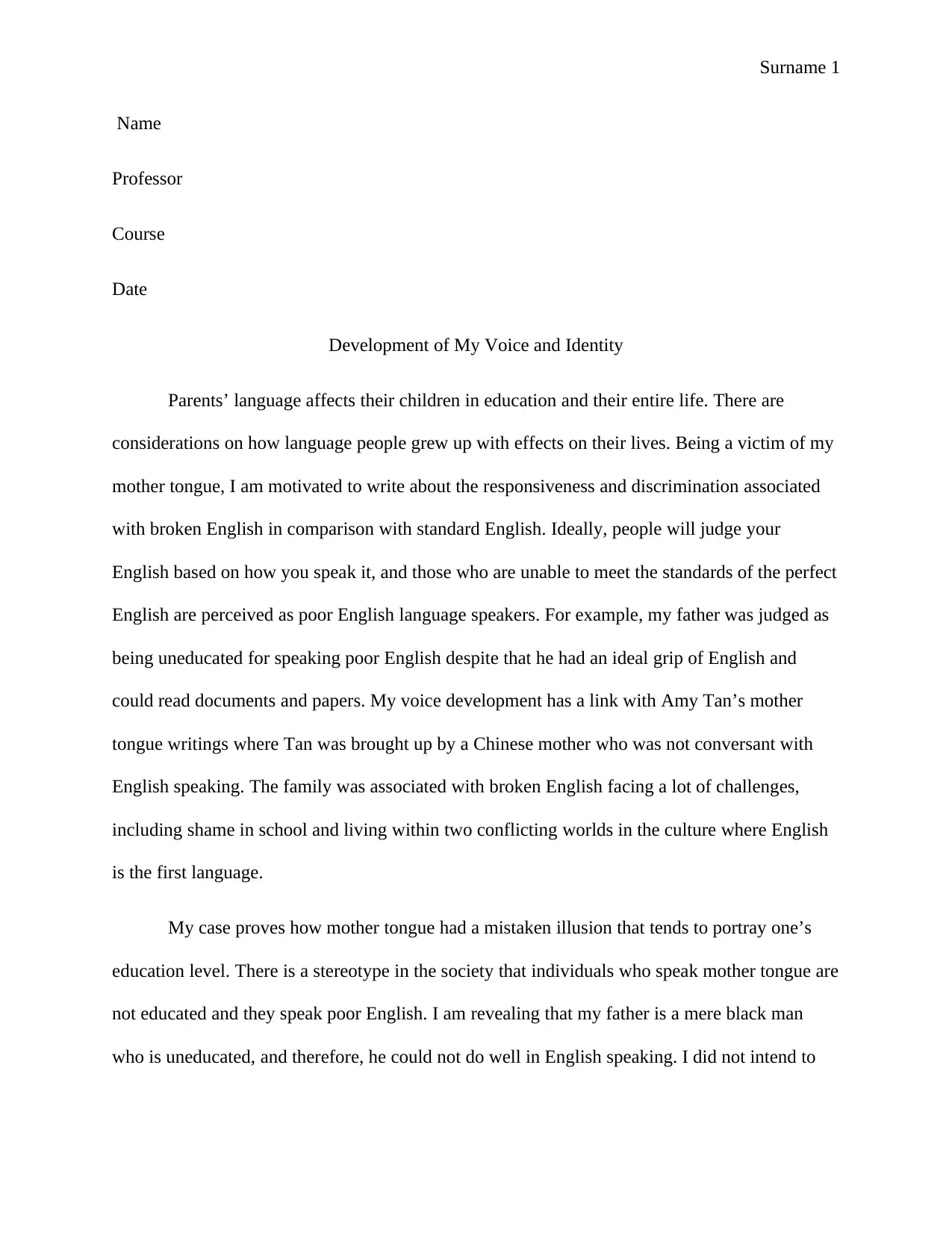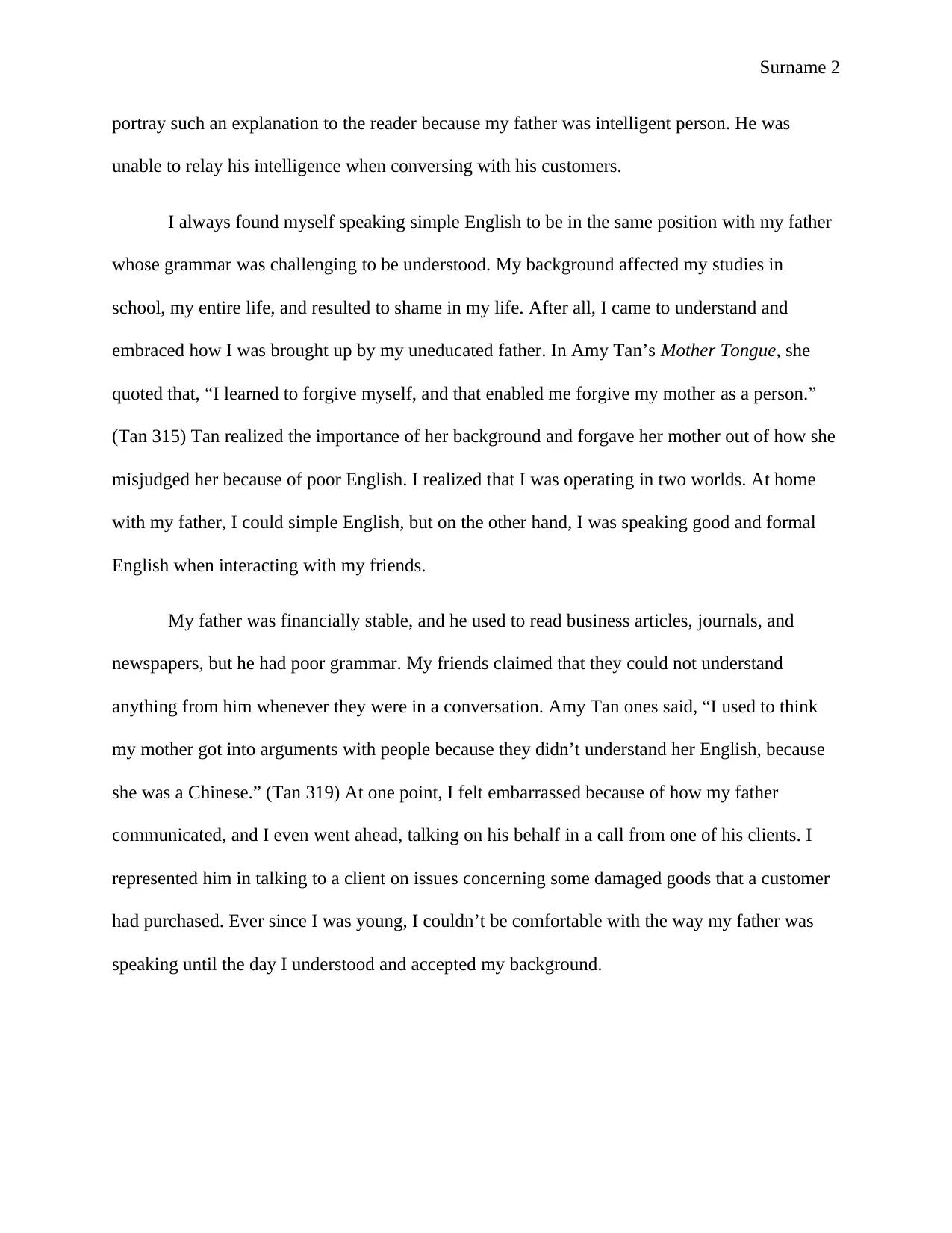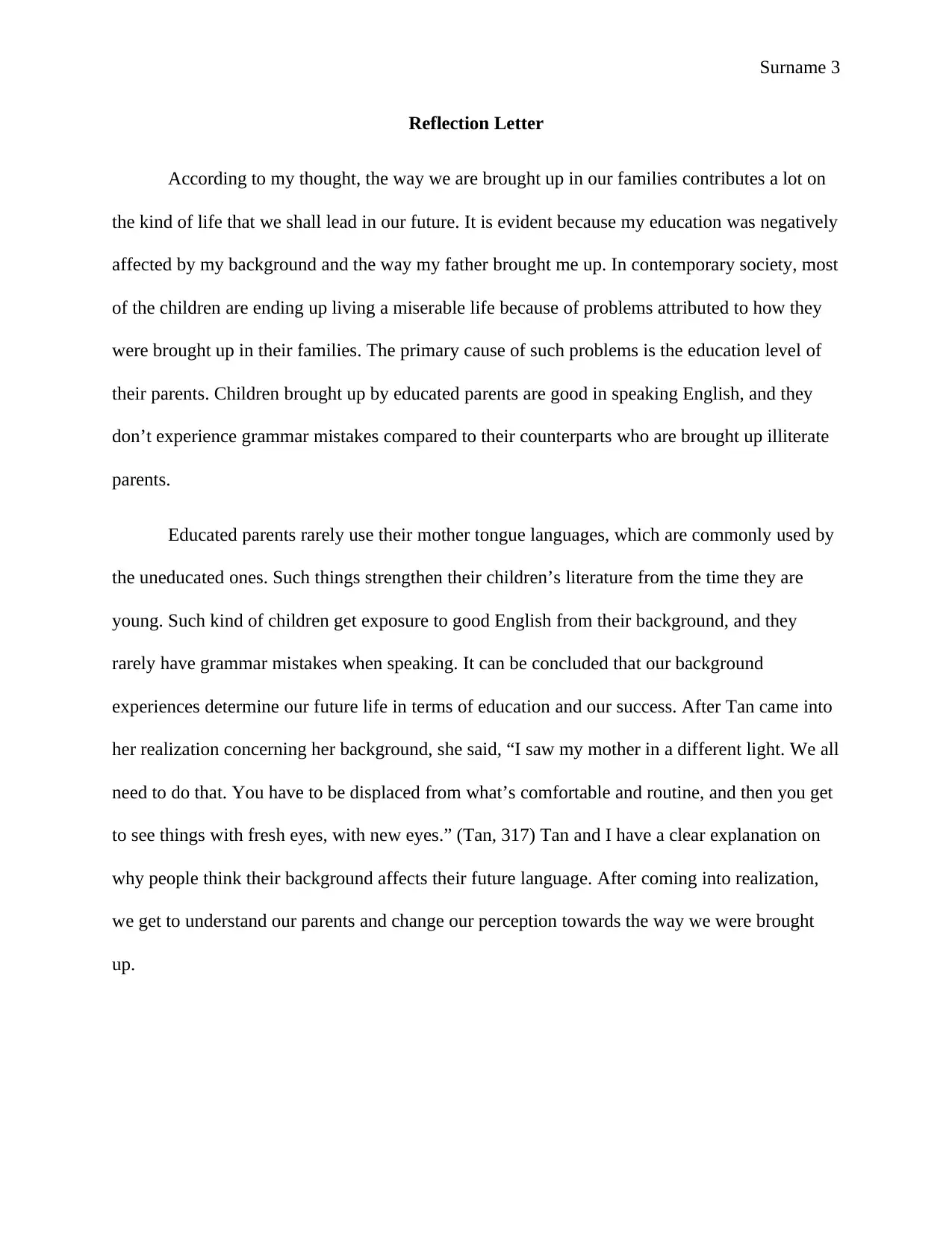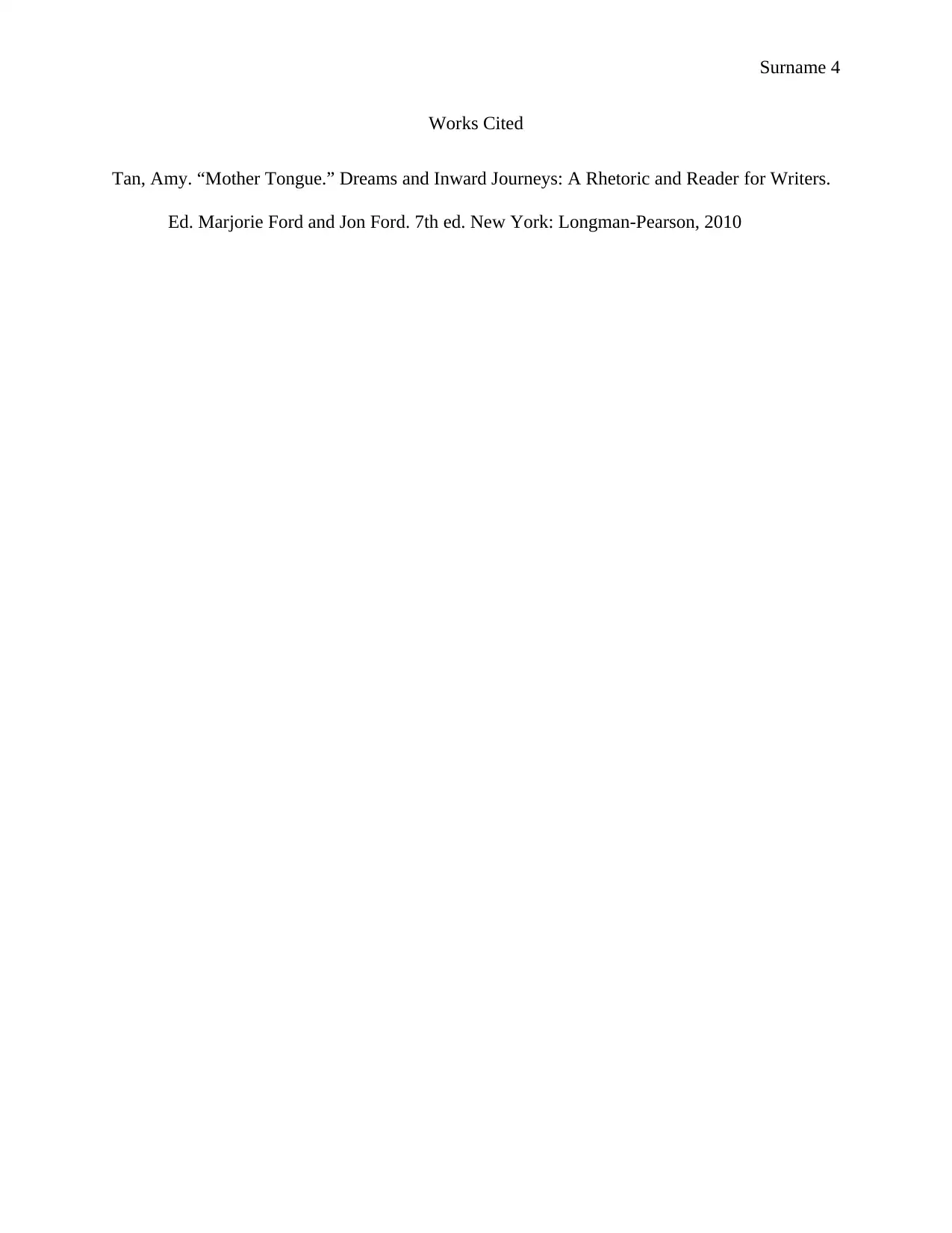Exploring Language and Identity: A Personal Narrative Essay
VerifiedAdded on 2022/11/18
|4
|963
|93
Essay
AI Summary
This essay is a personal narrative reflecting on the author's experiences with language and identity. The author explores how their upbringing and their father's use of English influenced their own language development and self-perception. The essay discusses the challenges of broken English and the societal judgments associated with it, drawing parallels to Amy Tan's "Mother Tongue." The author reflects on the impact of their background on their education and social interactions, highlighting the feeling of operating in two worlds—one at home and another with friends. The essay emphasizes the importance of accepting one's background and understanding the influence of family on future life and success. The author also shares how they came to understand and embrace their father's communication style, ultimately influencing their own voice and identity.

Surname 1
Name
Professor
Course
Date
Development of My Voice and Identity
Parents’ language affects their children in education and their entire life. There are
considerations on how language people grew up with effects on their lives. Being a victim of my
mother tongue, I am motivated to write about the responsiveness and discrimination associated
with broken English in comparison with standard English. Ideally, people will judge your
English based on how you speak it, and those who are unable to meet the standards of the perfect
English are perceived as poor English language speakers. For example, my father was judged as
being uneducated for speaking poor English despite that he had an ideal grip of English and
could read documents and papers. My voice development has a link with Amy Tan’s mother
tongue writings where Tan was brought up by a Chinese mother who was not conversant with
English speaking. The family was associated with broken English facing a lot of challenges,
including shame in school and living within two conflicting worlds in the culture where English
is the first language.
My case proves how mother tongue had a mistaken illusion that tends to portray one’s
education level. There is a stereotype in the society that individuals who speak mother tongue are
not educated and they speak poor English. I am revealing that my father is a mere black man
who is uneducated, and therefore, he could not do well in English speaking. I did not intend to
Name
Professor
Course
Date
Development of My Voice and Identity
Parents’ language affects their children in education and their entire life. There are
considerations on how language people grew up with effects on their lives. Being a victim of my
mother tongue, I am motivated to write about the responsiveness and discrimination associated
with broken English in comparison with standard English. Ideally, people will judge your
English based on how you speak it, and those who are unable to meet the standards of the perfect
English are perceived as poor English language speakers. For example, my father was judged as
being uneducated for speaking poor English despite that he had an ideal grip of English and
could read documents and papers. My voice development has a link with Amy Tan’s mother
tongue writings where Tan was brought up by a Chinese mother who was not conversant with
English speaking. The family was associated with broken English facing a lot of challenges,
including shame in school and living within two conflicting worlds in the culture where English
is the first language.
My case proves how mother tongue had a mistaken illusion that tends to portray one’s
education level. There is a stereotype in the society that individuals who speak mother tongue are
not educated and they speak poor English. I am revealing that my father is a mere black man
who is uneducated, and therefore, he could not do well in English speaking. I did not intend to
Paraphrase This Document
Need a fresh take? Get an instant paraphrase of this document with our AI Paraphraser

Surname 2
portray such an explanation to the reader because my father was intelligent person. He was
unable to relay his intelligence when conversing with his customers.
I always found myself speaking simple English to be in the same position with my father
whose grammar was challenging to be understood. My background affected my studies in
school, my entire life, and resulted to shame in my life. After all, I came to understand and
embraced how I was brought up by my uneducated father. In Amy Tan’s Mother Tongue, she
quoted that, “I learned to forgive myself, and that enabled me forgive my mother as a person.”
(Tan 315) Tan realized the importance of her background and forgave her mother out of how she
misjudged her because of poor English. I realized that I was operating in two worlds. At home
with my father, I could simple English, but on the other hand, I was speaking good and formal
English when interacting with my friends.
My father was financially stable, and he used to read business articles, journals, and
newspapers, but he had poor grammar. My friends claimed that they could not understand
anything from him whenever they were in a conversation. Amy Tan ones said, “I used to think
my mother got into arguments with people because they didn’t understand her English, because
she was a Chinese.” (Tan 319) At one point, I felt embarrassed because of how my father
communicated, and I even went ahead, talking on his behalf in a call from one of his clients. I
represented him in talking to a client on issues concerning some damaged goods that a customer
had purchased. Ever since I was young, I couldn’t be comfortable with the way my father was
speaking until the day I understood and accepted my background.
portray such an explanation to the reader because my father was intelligent person. He was
unable to relay his intelligence when conversing with his customers.
I always found myself speaking simple English to be in the same position with my father
whose grammar was challenging to be understood. My background affected my studies in
school, my entire life, and resulted to shame in my life. After all, I came to understand and
embraced how I was brought up by my uneducated father. In Amy Tan’s Mother Tongue, she
quoted that, “I learned to forgive myself, and that enabled me forgive my mother as a person.”
(Tan 315) Tan realized the importance of her background and forgave her mother out of how she
misjudged her because of poor English. I realized that I was operating in two worlds. At home
with my father, I could simple English, but on the other hand, I was speaking good and formal
English when interacting with my friends.
My father was financially stable, and he used to read business articles, journals, and
newspapers, but he had poor grammar. My friends claimed that they could not understand
anything from him whenever they were in a conversation. Amy Tan ones said, “I used to think
my mother got into arguments with people because they didn’t understand her English, because
she was a Chinese.” (Tan 319) At one point, I felt embarrassed because of how my father
communicated, and I even went ahead, talking on his behalf in a call from one of his clients. I
represented him in talking to a client on issues concerning some damaged goods that a customer
had purchased. Ever since I was young, I couldn’t be comfortable with the way my father was
speaking until the day I understood and accepted my background.

Surname 3
Reflection Letter
According to my thought, the way we are brought up in our families contributes a lot on
the kind of life that we shall lead in our future. It is evident because my education was negatively
affected by my background and the way my father brought me up. In contemporary society, most
of the children are ending up living a miserable life because of problems attributed to how they
were brought up in their families. The primary cause of such problems is the education level of
their parents. Children brought up by educated parents are good in speaking English, and they
don’t experience grammar mistakes compared to their counterparts who are brought up illiterate
parents.
Educated parents rarely use their mother tongue languages, which are commonly used by
the uneducated ones. Such things strengthen their children’s literature from the time they are
young. Such kind of children get exposure to good English from their background, and they
rarely have grammar mistakes when speaking. It can be concluded that our background
experiences determine our future life in terms of education and our success. After Tan came into
her realization concerning her background, she said, “I saw my mother in a different light. We all
need to do that. You have to be displaced from what’s comfortable and routine, and then you get
to see things with fresh eyes, with new eyes.” (Tan, 317) Tan and I have a clear explanation on
why people think their background affects their future language. After coming into realization,
we get to understand our parents and change our perception towards the way we were brought
up.
Reflection Letter
According to my thought, the way we are brought up in our families contributes a lot on
the kind of life that we shall lead in our future. It is evident because my education was negatively
affected by my background and the way my father brought me up. In contemporary society, most
of the children are ending up living a miserable life because of problems attributed to how they
were brought up in their families. The primary cause of such problems is the education level of
their parents. Children brought up by educated parents are good in speaking English, and they
don’t experience grammar mistakes compared to their counterparts who are brought up illiterate
parents.
Educated parents rarely use their mother tongue languages, which are commonly used by
the uneducated ones. Such things strengthen their children’s literature from the time they are
young. Such kind of children get exposure to good English from their background, and they
rarely have grammar mistakes when speaking. It can be concluded that our background
experiences determine our future life in terms of education and our success. After Tan came into
her realization concerning her background, she said, “I saw my mother in a different light. We all
need to do that. You have to be displaced from what’s comfortable and routine, and then you get
to see things with fresh eyes, with new eyes.” (Tan, 317) Tan and I have a clear explanation on
why people think their background affects their future language. After coming into realization,
we get to understand our parents and change our perception towards the way we were brought
up.
⊘ This is a preview!⊘
Do you want full access?
Subscribe today to unlock all pages.

Trusted by 1+ million students worldwide

Surname 4
Works Cited
Tan, Amy. “Mother Tongue.” Dreams and Inward Journeys: A Rhetoric and Reader for Writers.
Ed. Marjorie Ford and Jon Ford. 7th ed. New York: Longman-Pearson, 2010
Works Cited
Tan, Amy. “Mother Tongue.” Dreams and Inward Journeys: A Rhetoric and Reader for Writers.
Ed. Marjorie Ford and Jon Ford. 7th ed. New York: Longman-Pearson, 2010
1 out of 4
Related Documents
Your All-in-One AI-Powered Toolkit for Academic Success.
+13062052269
info@desklib.com
Available 24*7 on WhatsApp / Email
![[object Object]](/_next/static/media/star-bottom.7253800d.svg)
Unlock your academic potential
Copyright © 2020–2026 A2Z Services. All Rights Reserved. Developed and managed by ZUCOL.




